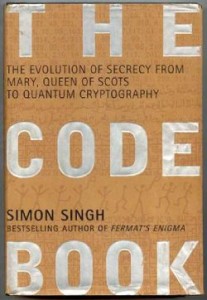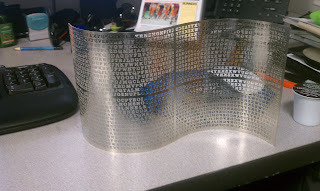This will be the first of many posts during the Spring 2012 term for this class. I will be teaching this course for the fourth time – and every time we do something new and exciting.
This year I’ve decided to integrate the book Worm by Mark Bowden (link to my Book Review blog post) into the course. Traditionally we discuss Botnets towards the end of the term and this book is one of the best representations in a traditional “book sense” of how the good guys are trying to mitigate one of the largest threats to the Internet as we know it.
 |
| Mark Bowden’s – Worm |
Another big part of this course is cryptology and steganography – Both will be discussed for a total of 4-5 weeks. We read The Code Book: The Science of Secrecy from Ancient Egypt to Quantum Cryptography by Simone Singh and conduct some hands on cryptanalysis – I’ve collected many crypto books and artifacts over the years and look forward to showing them to the class. One of my recent acquisitions was a Kryptos reproduction which can be purchased from the Spy Museum Store. I’m still baffled when people come into my office asking me what it is. I mean, come on – this is the statue that sits in front of the Central Intelligence Agency! Doesn’t everyone know that 🙂
 |
| Simon Singh’s – The Code Book |
 |
| Kryptos Replica on Rajewski’s Desk |
The final project for this class is an atypical assessment focused on having the students prove they mastered all of the content in the class. And no – this class doesn’t have tests or quizzes per-se. I love to focus on assessment that’s specifically designed to prove to the professor that the student actually understands the content, not just memorized definitions. I won’t publicly discuss the final project here in detail until I release it to the students.
Every term, as faculty, we get feedback from students on how course went – if you’re an academic you’re used to seeing these. Each and every time I’ve reviewed the comments, the consistent message from students is this is the best course they’ve taken at the college. I look forward to trying to meet/exceed that expectation of the spring 2012 class.